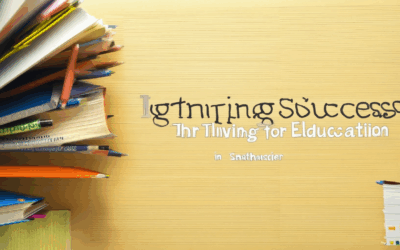Exploring the world of academia often requires more than just textbooks and research papers. Enter the realm of academic advice blogs—a dynamic platform offering valuable insights, practical tips, and expert guidance to help students, researchers, and professionals navigate their academic journeys. Whether you’re struggling with writing, researching, or staying organized, academic blogs provide a wealth of resources to enhance your learning experience. In this comprehensive guide, we’ll delve into the ins and outs of academic advice blogs, highlighting examples, evaluating their credibility, and even sharing tips on how to start your own. From understanding what makes a blog reputable to discovering how these platforms can be used as academic sources, this article serves as your ultimate roadmap to unlocking the full potential of academic blogging. Stay tuned as we explore the benefits, challenges, and strategies associated with academic advice blogs, ensuring you emerge equipped with the knowledge needed to thrive in your academic pursuits.
Key Takeaways
– Understanding Academic Blogs: Dive into in-depth analyses and specialized content tailored for researchers, students, and professionals.
– Monetizing Your Blog: Discover proven methods to earn through ad revenue, affiliate marketing, and premium content offerings.
– Blog vs. Academic Paper: Know the differences to tailor your content effectively, whether for casual engagement or scholarly contributions.
Example of an Academic Blog
An academic blog is a digital platform that publishes content focused on scholarly topics, research insights, and educational discussions. These blogs cater to students, researchers, educators, and professionals seeking knowledge, resources, and guidance in their fields.
Examples of Academic Blogs
- The Thesis Whisperer : Edited by Inger Mewburn, this blog offers comprehensive support for researchers and graduate students. It covers topics like thesis writing, research ethics, and academic publishing.
Visit The Thesis Whisperer - Patter : A collaborative blog initiated by Professor Pat Thomson, it provides insights into academic research, writing, and teaching. It emphasizes the importance of collaboration and sharing knowledge.
Visit Patter - Enroll Maven : Focused on educational resources and student success, Enroll Maven offers guides, tips, and insights for students, parents, and educators. It highlights effective learning strategies and college preparation.
Visit Enroll Maven - Inside Higher Ed : A leading source for news, opinion, and analysis on higher education. It covers trends, policies, and innovations in academia.
Visit Inside Higher Ed - The Chronicle of Higher Education : Known for its in-depth coverage of higher education issues, this blog features articles on faculty roles, campus life, and policy impacts.
Visit The Chronicle of Higher Education
Benefits of Reading Academic Blogs
Academic blogs offer numerous benefits:
- Stay updated on the latest research and trends in your field.
- Gain insights into academic writing, publishing, and research methods.
- Network with other scholars and professionals.
- Find resources, tools, and opportunities for professional development.
Competition Analysis
Several academic blogs stand out for their unique approaches:
- Enroll Maven excels in providing practical advice for students and educators, focusing on academic success and educational resources.
- The Thesis Whisperer is renowned for its support to early-career researchers, offering guidance on navigating academic challenges.
- Patter distinguishes itself through its collaborative model, inviting contributions from various experts in the field.
- Inside Higher Ed and The Chronicle of Higher Education are trusted sources for news and analysis, catering to a broader audience interested in higher education policy and trends.
Each of these blogs brings a unique perspective to the table, making them valuable resources for individuals at different stages of their academic journey.
Can a Blog Be an Academic Source?
A blog can sometimes be used as an academic source, depending on its content, reliability, and relevance to the topic being researched. Here’s a breakdown of the considerations:
- Content Quality : Blogs can provide valuable insights, particularly on current trends, research news, or personal perspectives. However, their content varies greatly in quality and accuracy.
- Peer Review : Most academic sources undergo peer review to ensure reliability. Blogs, unless published by a reputable organization or individual with expertise, are generally not peer-reviewed.
- Credibility : Evaluate the author’s credentials and the blog’s reputation. Some blogs are written by experts and consistently provide high-quality content, making them credible sources.
- Purpose : While blogs can supplement research with diverse viewpoints, they shouldn’t replace traditional academic sources like peer-reviewed journals.
- Citation Practices : Use citation guides like APA or MLA to properly credit blogs, acknowledging their role as supplementary sources.
In summary, blogs can complement academic research but shouldn’t be relied upon solely. Always cross-check information with credible, peer-reviewed sources.
Best Advice for Blogging
- Choose a niche you’re passionate about to keep your content focused and engaging.
- Start with high-quality content and aim for consistency in publishing to build trust with your audience.
- Optimize your blog’s SEO by using relevant keywords and creating meta descriptions to improve visibility in search engines.
- Engage with your readers by responding to comments and incorporating feedback into your future posts.
- Use images, infographics, and videos to enhance your content and make it more visually appealing.
- Promote your blog on social media platforms to reach a wider audience and grow your follower base.
- Collaborate with other bloggers or influencers to guest post and expand your reach.
- Stay updated with the latest trends in blogging and adapt your strategy to meet changing audience demands.
For more detailed guides and resources on improving your blogging skills, visit our Blogging Guide section on Enroll Maven.
SEO Best Practices for Bloggers
When optimizing your blog for search engines, focus on incorporating relevant keywords naturally into your content. Use tools like Google Keyword Planner to identify popular search terms related to your niche. Additionally, ensure your blog is mobile-friendly and loads quickly to improve user experience and SEO performance.
By consistently producing valuable and original content while following these tips, you can significantly enhance your blog’s visibility and attract a loyal audience. Don’t forget to leverage the resources available on Enroll Maven to further refine your approach and stay ahead of the competition.
What is an Academic Blog?
An academic blog is a type of online publication that combines the format of a traditional blog with content typically associated with academia. These blogs often focus on subjects such as education, research, specialized fields of study, or professional development. They serve as platforms for sharing informed perspectives, discussing emerging trends, and contributing to ongoing conversations within specific disciplines.
Characteristics of an Academic Blog
- Content Focus : Academic blogs tend to feature in-depth analyses, reviews, and evaluations rather than casual or anecdotal content.
- Audience : While accessible to a broad audience, academic blogs are particularly popular among researchers, students, professionals, and enthusiasts within specific fields.
- Scholarly Tone : Content is often well-researched, cited, and written in a formal or semi-formal style.
- Engagement : Many academic blogs foster discussion and debate by encouraging comments, guest posts, and interactive features.
Purposes of an Academic Blog
- Sharing expertise and knowledge in a particular field.
- Discussing and critiquing recent research, publications, or theories.
- Providing resources, tools, and guides for students, educators, or professionals.
- Fostering collaboration and networking among individuals in a discipline.
Common Topics Covered in Academic Blogs
- Education and learning strategies.
- Research methodologies and advancements.
- Career development and professional advice.
- Policy analysis and industry trends.
- Technology in academia and its impact on teaching and learning.
Examples of Competitors
- Inside Higher Ed
- The Chronicle of Higher Education
- Enroll Maven
These competitors often provide valuable insights and resources that align with our mission at Enroll Maven.
Do Educational Blogs Make Money?
Yes, educational blogs can definitely make money. With the right strategy, you can turn your passion for sharing knowledge into a profitable venture. Here are some proven ways to monetize an educational blog:
- Ad Revenue : One of the most common ways to earn money from a blog is through display ads. Platforms like Google AdSense allow you to place ads on your site, earning revenue whenever someone clicks on them. The earnings depend on factors like traffic and ad placement.
- Affiliate Marketing : By promoting educational resources, courses, or tools, you can earn commissions when your readers purchase through your links. Partnering with companies like Amazon Associates or niche-specific programs can be highly effective.
- Sponsored Content : Schools, colleges, or educational companies often seek partnerships with bloggers to promote their programs or services. You can charge a fee for featuring their content or mentioning their offerings.
- Subscription Models : Offering premium content through newsletters or membership sites allows you to charge subscribers for in-depth insights and exclusive resources.
- Course Sales : If you create your own online courses or curate educational materials, you can sell them directly through your blog. Platforms like Udemy or Teachable integrate easily with blogs.
- Digital Products : Create and sell eBooks, study guides, or printables related to your niche. These can be marketed directly to your audience, often on platforms like Gumroad or Etsy.
- Consulting Services : Position yourself as an expert in your field and offer consulting or advising services to schools, educators, or students looking for personalized guidance.
To maximize your blog’s potential, focus on building a loyal audience, diversifying your income streams, and staying updated with the latest trends in education and blogging. Platforms like Enroll Maven can help you connect with like-minded educators and share valuable resources.
Learn more about Enroll Maven .
What is the difference between a blog and an academic paper?
A blog and an academic paper are two distinct forms of written content, each serving different purposes, audiences, and structures. Below is a detailed comparison:
Purpose and Audience
- Blog : Primarily created for a general audience, blogs aim to inform, educate, or entertain readers on a wide range of topics. They often focus on sharing personal experiences, opinions, or news updates.
- Academic Paper : Intended for scholars, researchers, and specialists, academic papers present original research findings, theories, or analyses. They are typically published in peer-reviewed journals and are highly formal in tone.
Content Structure
- Blog : Typically consists of shorter, informal entries. Blogs may include lists, personal anecdotes, or casual discussions. Articles are usually concise and easy to read.
- Academic Paper : Features longer, detailed articles with extensive research, citations, and evidence-based arguments. Structure often includes abstracts, introductions, methodology sections, results, and conclusions.
Publishing Process
- Blog : Content is usually published online, often through platforms like WordPress or Medium. There are minimal to no restrictions on content length or format.
- Academic Paper : Goes through a rigorous peer-review process before publication. Journals like Elsevier or Springer often publish these papers.
Examples
- Blog Example : A post about “10 Tips for Staying Organized” provides practical advice for everyday life.
- Academic Paper Example : A study titled “The Impact of Social Media on Mental Health” presents empirical data and analysis.
Purpose Revisited
While both blogs and academic papers aim to communicate ideas, their primary purposes differ significantly. Blogs are meant to engage and inform a broad audience, while academic papers seek to contribute to ongoing scholarly discussions and advance knowledge in their fields.
Conclusion
Understanding the differences between blogs and academic papers helps readers choose the right medium for their communication needs. Whether you’re sharing casual thoughts or presenting cutting-edge research, knowing the unique strengths of each format ensures your message reaches the intended audience effectively.









0 Comments